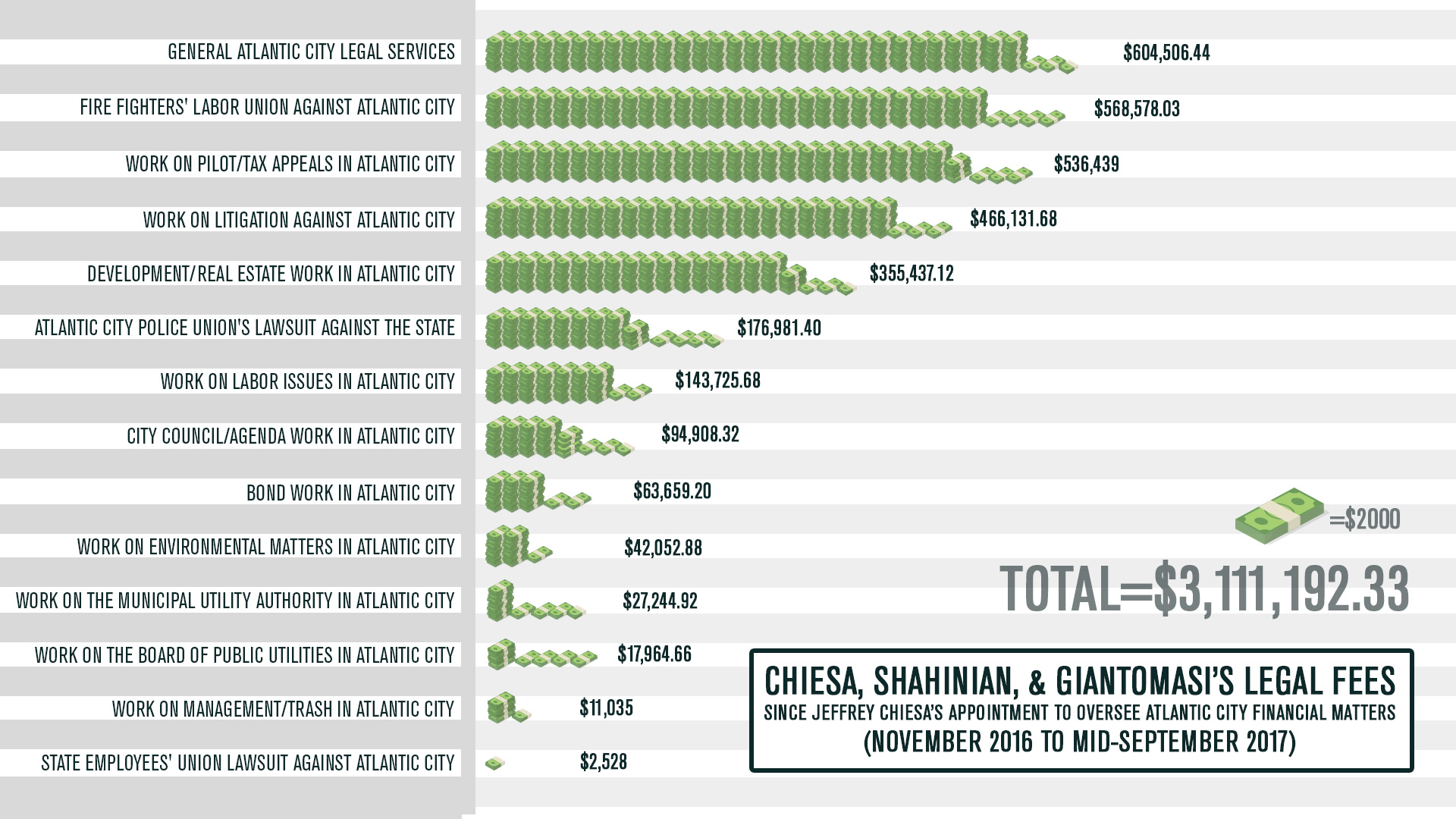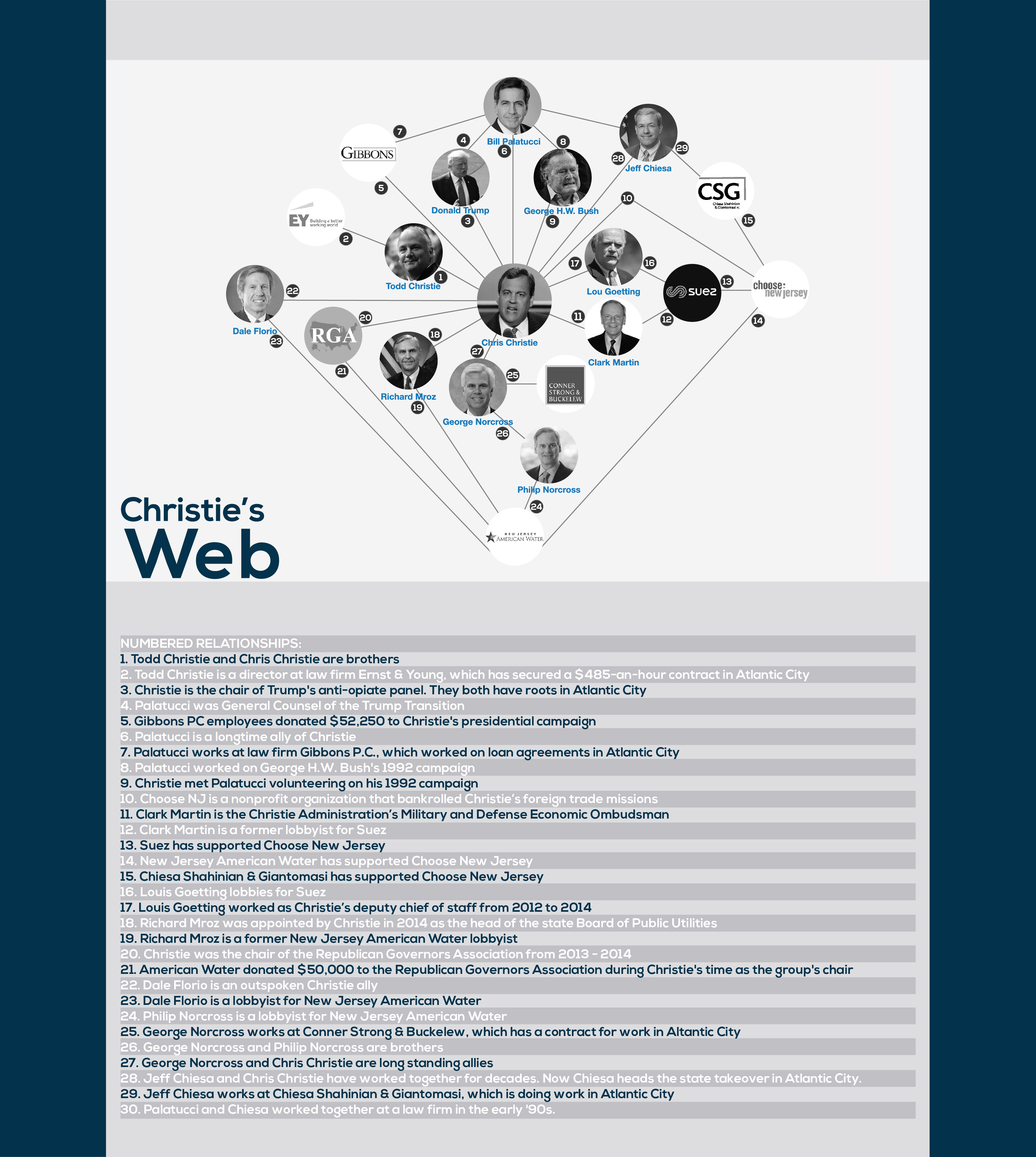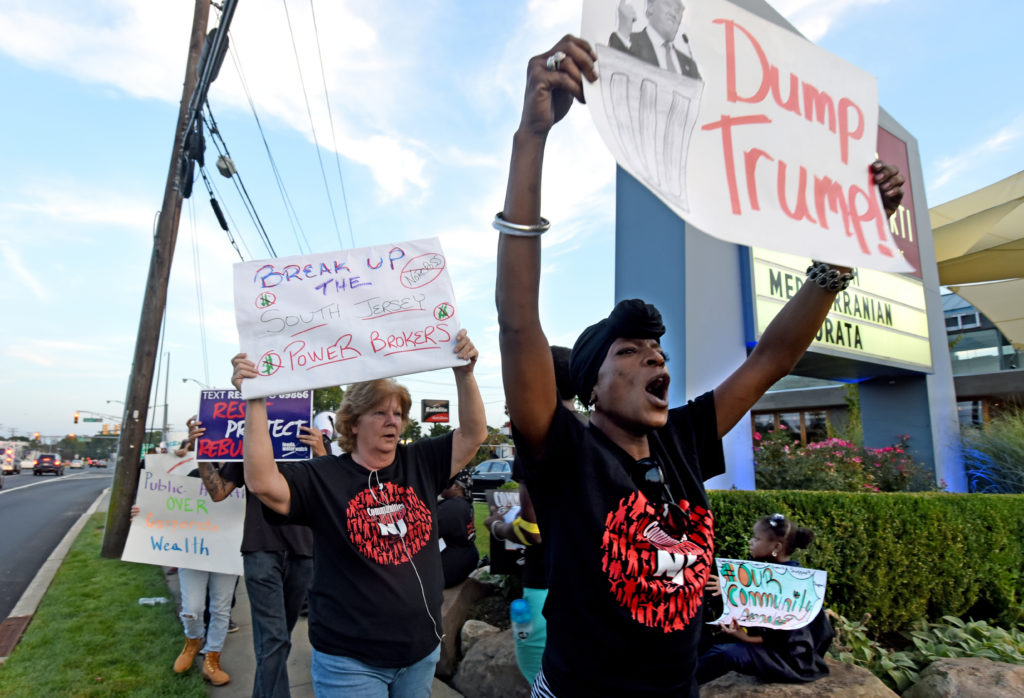New Jersey Gov. Chris Christie waves to the crowd on July 19, 2016, at the Republican National Convention in Cleveland, Ohio. Photo by Alex Wong/Getty Images.
Longtime allies and aides of New Jersey Gov. Chris Christie are poised to profit from the governor’s efforts to privatize and slash New Jersey government services. Documents reviewed by TYT Investigates reveal a pattern of Christie associates getting work from the state or lobbying for companies that have benefited from state privatization initiatives, including water companies American Water and Suez Water.
Christie’s allies and their clients have made donations to a number of organizations affiliated with the governor, including his 2016 presidential campaign, the Republican Governors Association, and Choose New Jersey (a nonprofit organization that bankrolled Christie’s foreign trade missions). According to records obtained by TYT, hundreds of thousands of dollars from the state’s takeover of Atlantic City—advertised as a means of saving the city from bankruptcy—have already flowed from taxpayers to Christie associates and their firms.
By enacting policies easing the way for privatization of local water utilities, Christie has made it possible for many of his allies, particularly those who lobby for private water companies, to profit. In 2015, Christie signed the Water Infrastructure Protection Act, which allows some local governments to sell their water utilities to private companies without public approval. Only municipalities whose infrastructure falls under an emergency status are eligible—but New Jersey is filled with failing infrastructure.
The American Society of Civil Engineers gave New Jersey’s drinking water a grade of C, and its wastewater programs a grade of D, in a June 2016 report, due to failing infrastructure and lack of funding to fix it. In theory, privatization can help: Many water systems are failing, and local governments may be unprepared to address their ailing infrastructures alone. Water-rights advocates worry that taxpayers will see increased costs.
In September, American Water’s local division, New Jersey American Water, asked the New Jersey Board of Public Utilities to increase the company’s rates by $129.3 million annually for their 2.7 million customers. If the rate hike is approved, the average monthly water bill will increase from $56.83 to $67.17 for a customer using 6,000 gallons of water a month.
Christie developed the 2015 legislation primarily alongside industry insiders. His 2010 task force that looked into crafting the policy included Kathleen Davis, a former lobbyist and director of governmental affairs for New Jersey American Water; and John Galandak, the former president of the Commerce and Industry Association of New Jersey, whose board of directors includes VP of External Affairs for Suez North America Matthew Mahoney. Galandak served on Christie’s gubernatorial transition team in 2009.
The Water Infrastructure Protection Act “remove[s] the rights of local communities to determine what’s best when it comes to clean, safe water, and . . . allow[s] multinational corporations to profit off increased water rates with virtually no recourse for New Jersey residents,” Jim Walsh, New Jersey director of Food & Water Watch, said in 2014.
Christie passed additional legislation this year that encourages municipalities to address issues with their water systems. The Water Quality Accountability Act places higher standards on water systems, and seeks to address widespread consensus that many water systems need maintenance or replacement. But the new law also positions private outfits to gain: “The law’s requirements are already met by big investor-owned utilities like New Jersey American Water . . . that have the financial muscle to invest in ongoing renewal programs,” wrote John Hurdle at NJ Spotlight.
“New Jersey American Water makes the necessary investments in order to meet all state and federal regulations while ensuring our customers receive high-quality, reliable water service to their homes. With the implementation of the Water Quality Accountability Act, water systems both public and private will be required to maintain and invest in their systems. There is a direct correlation between the rate people pay for water and the condition of the system that is treating and delivering that water,” a spokesperson for American Water told TYT Investigates. “We are open to conversations with any municipality that is interested in a partnership with New Jersey American Water to own and operate its water and/or wastewater system,” the spokesperson said.
While taxpayers could bear costs from Christie’s privatization efforts, Christie loyalists stand to benefit. One of them is Bill Palatucci, a veteran of Christie campaigns and Trump’s transition.
Last year, New Jersey hired Palatucci’s law firm, Gibbons P.C., to work out a loan agreement with Atlantic City. The firm billed New Jersey taxpayers $413,386 for its services in 2016 and 2017, payment records provided to TYT Investigates through a records request show.
“I played no role in that work as it was not my client. I will state that the results in Atlantic City as a result of the new law the firm helped to write are most promising,” Palatucci told TYT Investigates in an email.
The accounting firm Ernst & Young has secured a $485-an-hour contract for “continued analysis of Atlantic City’s finances and cash flow,” as well. Christie’s brother, Todd, is a director at the firm.
“Once again this takeover seems to be about politically connected attorneys reaping the benefits from the taxpayers when we’re supposed to be reining in spending and returning Atlantic City to fiscal prudence,” City Council President Marty Small said of Ernst & Young’s contract.
New Jersey’s Local Finance Board approved the Atlantic City takeover last November to help the city avoid filing for bankruptcy. The New Jersey Department of Community affairs named Jeff Chiesa, whom Christie had previously appointed as New Jersey’s attorney general, to lead the takeover at a rate of $400-an-hour.
After Chiesa stepped in, Atlantic City residents scored a victory to protect their water system from being sold off to private companies like Suez or New Jersey American Water. Last May, a rule preventing the state from monetizing Atlantic City’s water works expired, leaving drinking water largely in Christie’s hands.
“When you’re looking at using water systems to balance budgets … it doesn’t actually address the structural issues for the city,” Mary Grant, a campaign director at Food & Water Watch, told TYT Investigates.
“It’s a well-run system with clean, drinkable water,” Lena Smith, a New Jersey organizer at Food & Water Watch, told TYT Investigates. “There’s no reason to sell the water system.”
This past July, the City Council passed an ordinance requiring that city residents vote to approve any potential sale of the water system. The ordinance was a cautious victory for Smith.
“Our analysis is that we built enough political power to show governor Christie and his friends in the water system or who are interested in selling the water system that Atlantic City residents are willing to fight [for] . . . their water. In the short term, we’ve held them off from selling the water system,” she said.
Chiesa’s firm, Chiesa, Shahinian & Giantomasi, has billed the state $3,111,192.33 as of mid-September for their work since last November on Atlantic City’s state takeover, according to state attorney general payment records provided to TYT Investigates. Fees include “legal services” on a variety of issues in Atlantic City, like bonds, the city council, real estate, labor issues, and public utilities, according to the records.

“That’s outrageous that so much money is going to him and his law firm,” Grant said, “over a state takeover to take away those services and that oversight that the City Council is elected to have. I think it’s a violation of civil rights for Atlantic City residents to not have their City Council making the decisions that he’s making,” she added.
“We’re going to do everything we can to protect the city’s financial interests in a professional way,” Chiesa told The Philadelphia Inquirer in March, adding: “I understand, and it’s legitimate for people to want to look at our fees. It’s a significant discount on our fees.”
Christie’s Web
Christie, who is now the chair of Trump’s anti-opiate panel, has seen Atlantic City fall on hard times during his tenure as governor. Trump casinos declared bankruptcy four times. Since 2014, five of the city’s 12 casinos shut down.
In 2011, Trump’s debt to the state in back taxes from his casinos totaled almost $30 million. After a six-year battle in court, Trump negotiated a settlement of only $5 million with the state’s attorney general. It was Christie’s second year as governor.
“You can’t tell whether there’s something problematic, but it’s pretty striking that this [debt] was written down so much,” David Skeel, a professor at the University of Pennsylvania Law School, told the New York Times.
In March 2015, the Treasury Department fined the Trump Taj Mahal for violating federal anti–money laundering laws. Investor Carl Icahn—an early advisor to President Trump—bought the Taj Mahal in February of 2016, then closed it last October, laying off about 3,000 people. All told, the city lost 22,000 jobs between 2005 and 2016, according to Stockton University’s South Jersey Economic Review.
Both Chiesa, the state appointee overseeing Atlantic City, and Palatucci, whose law firm Gibbons P.C. negotiated the city loan agreement, worked with Christie in the early ‘90s at the lobbying firm Dughi & Hewit, P.C. Christie was Palatucci’s law partner; their biggest lobbying client was the for-profit college the University of Phoenix. In the years since, Palatucci and Chiesa have worked for Christie in a variety of functions in the public sector.
As New Jersey’s U.S. Attorney, Christie hired Chiesa to work for him in 2002. After Christie was elected governor, he made Chiesa the executive director of his transition team. In 2011, Christie nominated Chiesa to be New Jersey Attorney General. In 2013, when Sen. Frank Lautenberg (D-NJ) died, Christie appointed Chiesa to the seat. Chiesa served in the Senate from June to October, when Cory Booker was elected. Two years later, when Christie began his run for president, Chiesa donated $5,400 to his campaign, and $5,000 to his PAC, Leadership Matters for America.
Palatucci—who met Christie in 1992 when they were working on George H.W. Bush’s campaign—also helped Christie with his own presidential campaign, serving as his general counsel. He and other members of Gibbons P.C. donated $52,250 to the Christie presidential campaign, according to campaign-finance data compiled by Political MoneyLine.
When Christie joined the Trump transition team, Palatucci went with him, serving as general counsel. It was widely reported, first by the Washington Post, that Palatucci was one of the men pushed out in Trump’s November Christie purge. Palatucci disputed this report, telling TYT Investigates that he worked on the Trump transition team through election day.
“Following election day, I worked with [general counsel] Don McGahn as an advisor to the transition which continued to the inauguration,” he told TYT Investigates. The Washington Post report about his ouster, however, was dated November 15, 2016. Palatucci’s own LinkedIn page says that he worked on the transition team until November 2016.
Asked to confirm that he was not fired in the Christie “purge,” Palatucci said, “The Washington Post is never wrong?”

Republicans are not the only ones in Christie’s orbit who stand to gain.
Philip Norcross, brother of Democratic powerbroker George Norcross, has lobbied in Atlantic City and Trenton on behalf of New Jersey American Water. Philip Norcross also attended a state takeover meeting about Atlantic City in 2015. George Norcross was criticized by Jersey City’s mayor, Steve Fulop, for “dictating” the outcome of the state’s Atlantic City takeover to benefit himself.
The state takeover “was an action [Christie] took reluctantly, but one deemed absolutely necessary to save Atlantic City from certain bankruptcy and to prevent the state from losing a historic jewel on the Jersey Shore,” Christie spokesman Brian Murray told TYT Investigates.
American Water’s PAC has been a major donor to the political career of the youngest Norcross brother, Donald, including during his 2016 congressional campaign. In Atlantic City in June, George Norcross’ insurance brokerage firm, Conner Strong & Buckelew, won a contract with New Jersey’s Casino Reinvestment Development Authority for the state agency’s insurance needs. The brokerage firm won the contract without naming a maximum payment.
“Ties to [George] Norcross [in Atlantic City] are very apparent,” said Smith, the Food & Water Watch organizer.
George Norcross has long played an influential role in New Jersey politics, and is recognized as a powerful player. In 2003, Christie, then the state’s U.S. attorney, was the subject of scrutiny when he was seen meeting with Norcross over steak dinner. In 2006, Norcross—the subject of a bribery investigation—got a break from Christie, who said that the past administrations had mishandled the investigation, so he would not indict Norcross.

At a September protest against machine politics in Cherry Hill, N.J., activist Moneke Singleton-Ragsdale holds up a $100 bill with a picture of power broker George Norcross on it. Photo by April Saul.
This year, state officials approved an $86 million tax break for Norcross’s insurance firm to move its office to a new building in Camden.
Politico New Jersey wrote about George: “Norcross has enjoyed benefit after benefit during the Christie administration, playing a crucial role in every legislative victory Christie has had while seeing his own priorities signed into law by the governor . . . such as the expansion of charter and ‘renaissance’ schools and paring down public employee benefits.”
Suez and American Water have supported Christie’s nonprofit, Choose New Jersey, as has Chiesa’s firm. American Water donated $50,000 to the Republican Governors Association when Christie was the chair, which was from 2013 to 2014.
“I think corporate influence over our elected officials is really dangerous, not just through lobbying and through campaign contributions . . . we really need to reform that system.” said Mary Grant, the campaign director at Food & Water Watch. “Another issue that’s really dangerous is the revolving door issue at the state level with regulators in New Jersey in support of public utilities that oversee water rates. There’s that revolving door between water companies and other utilities and the people who regulate them, which is concerning,” she said.
Dale Florio, a lobbyist for New Jersey American Water, is also a staunch Christie ally. “Once he gets that momentum,” Florio told Politico in 2015 of Christie’s presidential bid, “you’ll see the whole dynamic of the race change.”
One former New Jersey American Water lobbyist, Richard Mroz, was appointed by Christie in 2014 as the head of the state Board of Public Utilities, which is now weighing New Jersey American Water’s proposed rate hike. Mroz met Christie in college and worked as Christie’s attorney in his 2009 gubernatorial campaign.
The lobbying team for Suez also includes Christie veterans. Louis Goetting lobbies for Suez after having worked as Christie’s deputy chief of staff from 2012 to 2014. Retired U.S. Air Force Maj. Gen. Clark W. Martin also is a former lobbyist for Suez, and is now the Christie administration’s Military and Defense Economic Ombudsman.
“The interests in the state takeover law by powerful Christie friends and allies is very apparent,” said Smith, “and people in Atlantic City know that and want their city to remain a city that works for the people and not corporate interests.”
Asked by TYT Investigates whether the governor has practices in place to guard against favoritism, Christie spokesman Brian Murray said, “Your accusations of favoritism are as salacious as they are wildly inaccurate and wholly unsupported by any facts.”
The Gamble In Atlantic City
“The urgency of the city’s current financial predicament cannot be understated,” Christie said in January 2016. The state’s cost-saving strategies involve cutting jobs and reducing pay for Atlantic City workers.
“I have to have the freedom to do what needs to be done down there to fix the problem,” Christie said on his radio show three months later. “Bloated salaries, bloated pensions, bloated agreements. Be able to negotiate with creditors. I’ve got to be able to do all that. If I don’t have the tools to do all that, then why bother?”
In his position as the state designee overseeing the city, Chiesa has the ability to disrupt people’s lives significantly—his job allows him to sell city assets and break union contracts.
Some of Chiesa’s bills, according to documents provided to TYT Investigates through a records request, are related to disputes with the local firefighters’ and police unions.
Workers worry that Chiesa is ready to do away with union contracts altogether. To save money, he announced plans in March to lay off 100 firefighters and 24 police officers. A letter from Chiesa outlines cuts to the police department, such as decreased overtime pay and increased co-pays on medications through the state health care plan. Union members expect 20 to 25 percent pay cuts on salaries. The unions have been fighting the state’s proposals in court; Chiesa called their lawsuits “money grabs.”

At a September protest against machine politics in Cherry Hill, N.J., activists march in front of the Caffe Aldo Lamberti restaurant where a Democratic fundraiser was being held for Democratic gubernatorial candidate Phil Murphy. Photo by April Saul.
“Those are things the people of Atlantic City can’t afford,” Chiesa said about union contracts. “They’re completely overwhelmed with high taxes, and there’s no pathway to sustain the city financially and continue to ignore the high salaries and other benefits and costs associated with these contracts.”
Christie signed a bill in August, as the unions were fighting in court, that incentivizes early retirement for Atlantic City police officers, firefighters, and first responders.
“We expected the takeover to be balanced,” said Bill DiLorenzo, president of Atlantic City Professional Firefighters Local 198. “What we’re seeing is the fire department taking the brunt of all the cuts.”
Last month, a state judge approved a plan to lay off 15 firefighters. Chiesa had sought to lay off as many as 100. From January to October, the fire department reduced its staff by 30—nine left on their own accord following Christie’s legislation incentivizing retirement, according to court records. The layoffs are set to take effect next February, after Christie’s successor has taken office.
State spokeswoman Lisa Ryan said the city has “an artificially and unnecessarily high number of firefighters.” There are currently 195.
Something in the Water
Past examples of state privatization have left local activists concerned about what could happen in Atlantic City, particularly in terms of water services. Christie has rewarded water companies with tax credits and friendly policies.
In Hoboken, City Council members are reevaluating their contract with Suez Water, and are also investigating how they racked up an $8.3 million bill from the French company over three years. One City Council member, Ravi Bhalla, was criticized because his lobbying firm had Suez as a client, and recused himself from work related to the city’s water contract.
In Bayonne, residents saw their water bills increase by nearly 28 percent last year, after Wall Street firm Kohlberg Kravis Roberts, in partnership with Suez, began managing municipal water supply.
Municipal water services in Camden were previously managed by Suez—until the state found the company was doing an inadequate job. Camden had entered a 20-year agreement with Suez in 1999. Three years later, as in Atlantic City, the state took over in an attempt to fight the city’s poverty, aiming to address infrastructure issues as part of the city’s renewal. Neither the Suez contract nor the state takeover yielded much in terms of results. After a 2009 audit found that Suez cost taxpayers millions in Camden in wasted water, the city sued Suez. Then-Gov. Jon Corzine ended the takeover the following year. The city reached a settlement with Suez in 2012.

In 2015, American Water received $164 million in tax credits from the state to move their headquarters to Camden, where public school water fountains have been shut off since 2002 because they are unsafe to drink from. In February 2016, New Jersey American Water took control of the city’s water and sewage systems in a $125 million, 10-year contract. Philip Norcross’ law firm, Parker McCay, won a $200,000 deal with the city for real estate work, cashing in on the Camden redevelopment.
Whereas police unions in Atlantic City are fighting layoffs, the police in Camden were completely dissolved and replaced by county police.
Activists in Atlantic City worry that they have already seen what lies ahead. “Camden was the same thing as Atlantic City. You get them to a crisis. Christie wants to change the whole dynamic of public bargaining and public employee contracts. That’s how a lot of us minorities get into the middle class, through the public union,” said Camden NAACP delegate Darnell Hardwick.
When Christie’s successor takes office in January, he or she will have the opportunity to reinstate power to Atlantic City’s elected government.
Democratic candidate Phil Murphy said in February that he was against the state takeover. “I like to think of it as a partnership, not a takeover,” he said. In July, he met with the city firefighters’ union.
“I’m not a fan of these takeovers,” Murphy said at an October 18 gubernatorial debate. “Every single time, it’s over the top. Every single time, it’s in communities of color, whether it’s school districts or entire communities. I am a believer that communities like Atlantic City need a governor who is a partner working on the ground hand in glove to continue to develop the momentum that has started its nascent stages.
Republican candidate Kim Guadagno, current lieutenant governor, said “some very hard decisions had to be made.” She added that Atlantic City residents are on hard times, and that she would lower property taxes.
“You’ve left the middle class behind, and now you’ve left the truth behind,” Murphy replied. “I would undo that state takeover,” he said.
Clark Martin, the former Suez lobbyist, gave $5,450 to Kim Guadagno, according to state campaign-finance data.
In September, George Norcross hosted a $2,500 per person fundraiser for Murphy. Gary Albertson, senior VP of business development for Suez North America, gave Murphy $1,000 in March, according to state campaign-finance data.
Follow TYT Investigates on Twitter, Facebook, and YouTube to stay on top of exclusive news stories from The Young Turks.
April Saul is a Pulitzer Prize–winning photojournalist documenting life in Camden, N.J. View more of her photos here.

